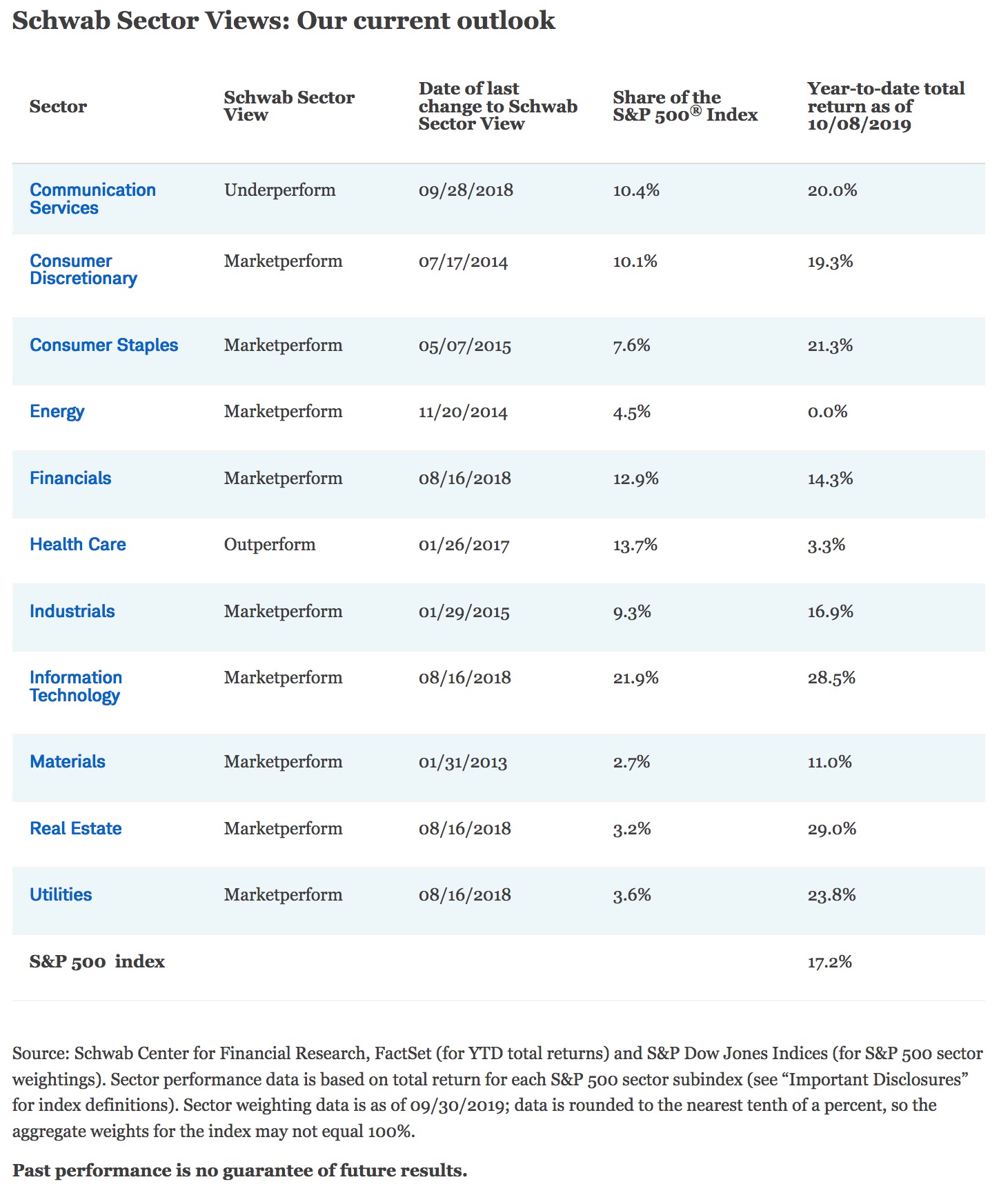It's back! Just as recession worries seemed to be fading after the flare-up in August, investors are once again alarmed at the prospect, amid a barrage of weak data both in the U.S. and around the globe. We recently penned that we're on watch for a recession, given our belief that we're late in the business cycle. We certainly are seeing some signs of that in the markets, with some of the traditionally defensive sectors keeping up with—or even outpacing—some of the more cyclical sectors over the past year. But as the title of this piece implies, some of the classic defensive sectors currently come at a dear price.
[backc url='https://sendy.advisoranalyst.com/l/RBKyvgku9pRt3znSJFpC6Q/DYwv4K8JNOD1gWEZHfVaRA/DrjHEJYBKaw763fKMcUyN2Sg']What makes a sector defensive?
When we talk about defensive sectors, we're typically focused on the traditional stalwarts: Utilities, Consumer Staples and Health Care.
- Utilities include heavily regulated gas and electric industries with relatively steady revenues and earnings. In a sense, they are monopolies that can withstand the ebbs and flows of the economy. Even if demand for energy were to decline enough to affect revenues, the companies can petition governing bodies for rate increases.
- Consumer Staples comprise the companies that produce the goods and provide the services that most people won't do without even in a recession. Food and personal items are obviously at the top of the list of necessities, but the group also includes alcohol and less-expensive items that are inconsequential to the budget, like soda.
- Health Care is pretty straightforward, right? That isn't typically something that people can do without. On one hand, it has unique growth properties (biotech), but it also has the stability of hospitals and equipment makers. However, there is also a political component, which includes regulation risks associated with drug makers and health maintenance organizations—of which you are sure to hear more heading into next year's election.
What does market performance tell us?
In terms of their performance, all three sectors have earned the "defensive" moniker, as they historically have been outperformers, on average, in the late-expansion phase of the business cycle and into recessions. In fact, they round out three of the top four late-expansion-cycle relative performers since 1989 (when the sector classifications data began). While the sample is limited, with just three cycles to go on, the intuition behind the sector classifications seems to hold. (We'll leave Energy out of the discussion, as it's fair to say that energy prices are typically a perpetrator of late cycles and recessions, not a place of refuge.)
Source: Charles Schwab, Bloomberg, 1989-2018 monthly returns. Sector performance is relative to the S&P 500 index. Past performance is no guarantee of future results.
So where are we now? As we have stated, we think that we may now be in a late-expansion phase of this business cycle. While there are a couple of missing ingredients that make it hard to say for sure, the market performance over the past year may be confirming that we are indeed in the final stages. Consumer Staples and Utilities have been among the top three performers since September 30, 2018, by a margin of two-to-one and three-to-one, respectively, relative to Information Technology. Now, as we've talked about, this time might be different, because some of the economic elements are reminiscent of the 1990s, when an inverted yield curve warned of recession but it did not occur. At that time, the Federal Reserve also made "mid-cycle" rate cuts as insurance against rising global risks.
Defensive at any price?
Whether we are headed for a recession or not, there are warning signs that all of the "defensive" sectors might not be as defensive as they have been in the past. One of the reasons we think this is because of the strong run-up in valuations, particularly in the Utilities and Consumer Staples sectors. In fact, the Utilities sector's price/earnings ratio is at a record high—well above the peaks that occurred prior to past recessions. This is likely due, in part, to the low-interest-rate environment and investors’ reach for dividend yield. In the table below, we provide six valuation metrics for each of the sectors: earnings, dividends, book value, cash flow, sales, and forward earnings. In order to compare the sectors, their current valuations were scored against their respective historical averages. We then averaged their scores and ordered them from best to worst valuations.
Source: Charles Schwab, Ned Davis Research, as of 9/30/2019. Number of standard deviations from mean in 20-year data range (price to valuation measure). Standard deviation is a statistical measure of the extent to which numbers are spread around their average.
As you can see, Utilities comes in as the most overvalued of all of the sectors, and Consumer Staples is not far behind. But you'll also notice that Health Care is ranked as one of the cheapest of all of the sectors. This is part of the reason why it is the only defensive sector that we think will outperform over the coming three- to six-month time horizon. While the other defensive sectors could, of course, continue to lead the market amid all of the uncertainty and strong relative momentum, we place them in the "marketperform" category, in large part due to their lofty valuations.
How can you defensively tilt your portfolio?
First, we repeat this refrain because we think that it is so important: The best defense to market volatility is to maintain a well-diversified portfolio that is in line with your risk tolerance and return objectives (a Schwab Financial Consultant can help you with this).
Second, while bonds are not a perfect hedge to equity risk, a well-rounded basket of fixed income investments can be an excellent diversifier of risk. Tilting your fixed income holdings toward less risky securities with longer duration can provide an additional measure of defensiveness.
Finally, tilting toward Health Care, in our opinion, as well as staying diversified internationally to spread the risk around the globe, can be key to playing defense while staying invested.
Copyright © Schwab Sector Views













